Russia: 1918-1924
In the months following the revolution, John Reed spent a lot of time with Lenin: "A short, stocky figure, with a big head set down in his shoulders, bald and bulging. Little eyes, a snubbish nose, wide, generous mouth, and heavy chin; clean-shaven now, but already beginning to bristle with the well-known beard of his past and future. Dressed in shabby clothes, his trousers much too long for him. Unimpressive, to be the idol of a mob, loved and revered as perhaps few leaders in history have been. A strange popular leader - a leader purely by virtue of intellect; colourless, humourless, umcompromising and detached, without picturesque idiosyncrasies - but with the power of explaining profound ideas in simple terms, of analysing a concrete situation. And combined with shrewdness, the greatest intellectual audacity." (1)
It has been claimed that the head of the American Red Cross in Russia, Raymond Robins met Lenin on average three times a week. The two men had a series of debates on politics. On one occasion Lenin said to Robins: "We may be overthrown in Russia, by the backwardness of Russia or by foreign force, but the idea in the Russian revolution will break and wreck every political social control in the world. Our method of social control dominates the future. Political social control will die. The Russian revolution will kill it everywhere." Robins dismissed this idea of the future: "But my government is a democratic government. Do you really say that the idea in the Russian revolution will destroy the democratic idea in the government of the United States?... Our national government and our local governments are elected by the people, and most of the elections are honest and fair, and the men elected are the true choices of the voters. You cannot call the American government a bought government."
Lenin replied: "I'll tell you, our system will destroy yours because it will consist of a social control which recognizes the basic fact of modern life. It recognizes the fact that real power today is economic and that the social control of today must therefore be economic also.... This system is stronger than yours because it admits reality. It seeks out the sources of daily human work-value and, out of those sources, directly, it creates the social control of the state. Our government will be an economic social control for an economic age. It will triumph because it speaks the spirit, and releases and uses the spirit, of the age that now is. Therefore, Colonel Robins, we look with confidence at the future. You may destroy us in Russia. You may destroy the Russian revolution in Russia. You may overthrow me. It will make no difference. A hundred years ago the monarchies of Britain, Prussia, Austria, Russia, overthrew the government of revolutionary France. They restored a monarch, who was called a legitimate monarch, to power in Paris. But they could not stop, and they did not stop, the middle-class political revolution, the revolution of middle class democracy, which had been started at Paris by the men of the French Revolution of 1789. They could not save feudalism. Every system of feudal aristocratic social control in Europe was destined to be destroyed by the political democratic social control worked out by the French Revolution. Every system of political democratic social control in the world to-day is destined now to be destroyed by the economic producers' social control worked out by the Russian revolution." (2)
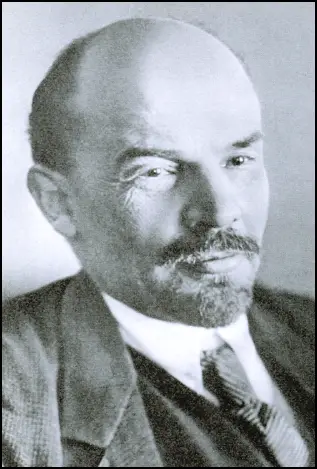
Lenin liked discussing politics with Arthur Ransome, who developed a very positive impression of the Bolshevik leader. The journalist later wrote: "Not only is he without personal ambition, but, as a Marxist, believes in the movement of the masses... His faith in himself is the belief that he justly estimates the direction of elemental forces. He does not believe that one man can make or stop the revolution. If the revolution fails, it fails only temporarily, and because of forces beyond any man's control. He is consequently free, with a freedom no other great leader has ever had... He is as it were the exponent not the cause of the events that will be for ever linked with his name."
Ransome told Lenin that a Marxist revolution was unlikely to take place in Britain. Lenin disagreed and replied: "We have a saying that a man may have typhoid while still on his legs. Twenty, maybe thirty years ago, I had abortive typhoid, and was going about with it, had it some days before it knocked me over. Well, England and France and Italy have caught the disease already. England may seem to you untouched, but the microbe is already there." (3)
Harold Williams, a journalist working for the Daily Chronicle, reported that stories suggested that Lenin was originally a German agent: "Lenin is an interesting figure. It is absurd to regard him as a mere German agent. I imagine that in pursuit of his ends Lenin is willing to use all available means, and if the Germans like to supply money or officers for the purpose of effecting a social revolution in Russia he gladly accepts even their services. Mere money for his personal use could not tempt such a man. He is utterly headstrong, oblivious of realities, oblivious of what he regards as bourgeois morality, oblivious of immediate consequences. He sees only his goal, the complete and forcible establishment of Socialism in Russia." (4)
The Red Terror
David Shub who knew Lenin well believed he was willing to use extreme methods to maintain power. When he discovered that Lev Kamenev had abolished capital punishment for desertion in the Russian Army he was furious. "How can one make revolution without executions?" When he attempted to defend his decision Kamenev was told that he was expressing "an unpardonable weakness". Lenin once asked Leon Trotsky: "Do you really think that we shall be victorious without using the most cruel terror?" (5)
In December, 1917, Felix Dzerzhinsky was appointed by Lenin as Commissar for Internal Affairs and head of the All-Russian Extraordinary Commission for Combating Counter-Revolution and Sabotage (Cheka). As Dzerzhinsky later commented: "In the October Revolution, I was a member of the Military Revolutionary Committee, and then I was entrusted with the task of organizing the Extraordinary Commission for the Struggle against Sabotage and Counterrevolution I was appointed its Chairman, holding at the same time the post of Commissar for Internal Affairs." (6)
A few days later he told senior members of Cheka: "Our Revolution is in serious danger. We tolerate too good-naturedly what is transpiring around us. The forces of our enemies are organizing. The counter-revolutionaries are at work and are organizing their groups in various sections of the country. The enemy is encamped in Petrograd, at our very hearth! We have indisputable evidence of this and we must send to this front the most stern, energetic, hearty and loyal comrades who are ready to do all to defend the attainments of our Revolution. Do not think that I am on the look-out for forms of revolutionary justice. We have no need for justice now. Now we have need of a battle to the death! I propose, I demand the initiation of the Revolutionary sword which will put an end to all counter-revolutionists." (7)
Like most Bolshevik leaders, Dzerzhinsky did not come from the working class. He was the son of a rich Polish landowner. "He was fair, slightly round-shouldered, with a short pointed beard and transparent eyes with dilated pupils. There were moments when his friendly smile gave way to icy sternness. At such times his eyes and ascetic bloodless lips revealed a demoniac fanaticism. Rigorous self-denial, incorrigible honesty, and a frigid indifference to the the opinions of others completed his make-up. His natural modesty, unassuming air and quiet manners set him apart. He was the great puritan, the 'saint' of the upheaval. Frail and given to occasional fits of melancholy, he sought retirement in unceasing labour behind closed doors, away from the multitude and party comrades alike. For most of the latter he had little respect; nearly all of them came to fear him, some distrusted him, and few mourned him when he died... In his bleak asceticism, complete devotion to Lenin, personal unselfishness, and utter lack of feeling towards political opponents, he had no equal." (8)
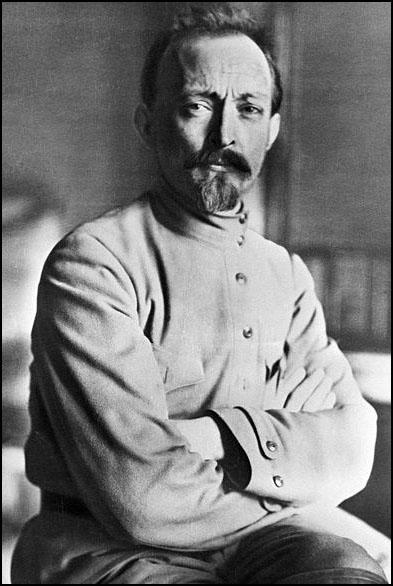
In an interview in the Bolshevik newspaper, Novaya Zhizn, Dzerzhinsky admitted: "We stand for organized terror - this should be frankly admitted. Terror is an absolute necessity during times of revolution. Our aim is to fight against the enemies of the Soviet Government and of the new order of life. We judge quickly. In most cases only a day passes between the apprehension of the criminal and his sentence. When confronted with evidence criminals in almost every case confess; and what argument can have greater weight than a criminal's own confession." (9) Walter Duranty, a journalist working for the New York Times claimed that "the fear of the Cheka was so great those early days in Moscow that people made a detour rather than step on the sidewalk in front of its main building on Lubyanka Square." (10)
After advances made by the White Army in February 1918, Lenin proclaimed that the "Socialist Fatherland" was in danger: "Agents of the speculators, gangsters, counter-revolutionary agitators, and German spies are to be shot on the spot... There had not been a single revolution in history when people did not... manifest salutary firmness by shooting thieves on the spot... A dictatorship is an iron power, possessing revolutionary daring and swiftness of action, ruthless in crushing exploiters as well as hooligans." (11)
In March, 1918, Moisei Uritsky joined the Communist Secret Police (Cheka) and was appointed Commissar for Internal Affairs in the Northern Region. He was assassinated by Leonid Kannegisser, a young military cadet, on 17th August, 1918. Anatoli Lunacharsky commented: "They killed him. They struck us a truly well-aimed blow. They picked out one of the most gifted and powerful of their enemies, one of the most gifted and powerful champions of the working class." (12)
Lenin was furious that he had lost one of his most important followers. In his orders to his subordinates Lenin made it clear that he expected the rigorous imposition of the Red Terror. In one order he told the chairman of the Council of People's Commissars that: "We must carry out a ruthless mass terror against the kulaks, priests and White Guards. All suspicious persons should be detained in a concentration camp outside the city." (13)
The same day he sent a wire to the Nizhny Novgorod Soviet: "In Nizhny Novgorod there are clearly preparations for a White Guard uprising. We must gather our strength, set up a doctorial troika and institute mass terror immediately; shoot and ferret out hundreds of prostitutes who get the soldiers drunk, former officers, etc. Not a moment of delay. It is necessary to act all-out. Mass searches, execution for concealment of weapons. Mass seizures of Mensheviks and other unreliables." (14)
On 30th August, 1918, Lenin spoke at a meeting in Moscow. According to Victor Serge: "Lenin arrived alone; no one escorted him and no one formed a reception party. When he came out, workers surrounded him for a moment a few paces from his car." As he left the building Dora Kaplan, a member of the Socialist Revolutionaries, tried to ask Lenin some questions about the way he was running the country. Just before he got into his car Lenin turned to answer the woman. Serge then explained what happened next: "It was at this moment Kaplan fired at him, three times, wounding him seriously in the neck and shoulder. Lenin was driven back to the Kremlin by his chauffeur, and just had the strength to walk upstairs in silence to the second floor: then he fell in pain. There was great anxiety for him: the wound in the neck could have proved extremely serious; for a while it was thought that he was dying." (15)
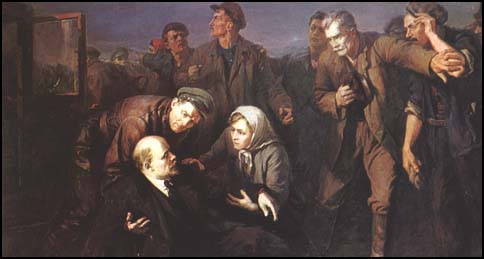
Two bullets entered his body and it was too dangerous to remove them. Kaplan was soon captured and explained that she had attempted to kill him because he had closed down the Constituent Assembly. In a statement to the police she confessed to trying to kill Lenin. "My name is Fanya Kaplan. Today I shot at Lenin. I did it on my own. I will not say whom I obtained my revolver. I will give no details. I had resolved to kill Lenin long ago. I consider him a traitor to the Revolution. I was exiled to Akatui for participating in an assassination attempt against a Tsarist official in Kiev. I spent 11 years at hard labour. After the Revolution, I was freed. I favoured the Constituent Assembly and am still for it." (16)
On 2nd September, as Lenin's life hung in the balance, Arthur Ransome, a British journalist, wrote an obituary hailing the founder of Bolshevism as "the greatest figure of the Russian Revolution". Here "for good or evil was a man who, at least for a moment, had his hand on the rudder of the world". He went on to say "common peasants who had known Lenin attested to his goodness, his extraordinary generosity to children. The workers looked up to him... not as an ordinary man, but as a saint". Without Lenin, Ransome concluded, the soviets would not perish, but they would lose their vital direction. "Fiery Trotsky, ingenious, brilliant Radek, are alike unable to replace the cool logic of the most colossal dreamer that Russia produced in our time." (17)
Joseph Stalin, who was in Tsaritsyn at the time of the assassination attempt on Lenin, sent a telegram to Yakov Sverdlov suggesting: "having learned about the wicked attempt of capitalist hirelings on the life of the greatest revolutionary, the tested leader and teacher of the proletariat, Comrade Lenin, answer this base attack from ambush with the organization of open and systematic mass terror against the bourgeoisie and its agents." (18)
Leon Trotsky agreed and argued in My Life: An Attempt at an Autobiography (1930): "The Socialist-Revolutionaries had killed Volodarsky and Uritzky, had wounded Lenin seriously, and had made two attempts to blow up my train. We could not treat this lightly. Although we did not regard it from the idealistic point of view of our enemies, we appreciated the role of the individual in history. We could not close our eyes to the danger that threatened the revolution if we were to allow our enemies to shoot down, one by one, the whole leading group of our party." (19)
Poster, "Bolshevik Freedom" blaming Leon Trotsky for the Red Terror (1919)
The Bolsheviks newspaper, Krasnaya Gazeta, reported on 1st September, 1918: "We will turn our hearts into steel, which we will temper in the fire of suffering and the blood of fighters for freedom. We will make our hearts cruel, hard, and immovable, so that no mercy will enter them, and so that they will not quiver at the sight of a sea of enemy blood. We will let loose the floodgates of that sea. Without mercy, without sparing, we will kill our enemies in scores of hundreds. Let them be thousands; let them drown themselves in their own blood. For the blood of Lenin and Uritsky, Zinovief and Volodarski, let there be floods of the blood of the bourgeois - more blood, as much as possible." (20)
Morgan Philips Price, a journalist working for the Manchester Guardian, reported that the Red Terror was announced in Izvestia on 7th September, 1918. "There was no mistaking its meaning. It was proposed to take hostages from the former officers of the Tsar's army, from the Cadets and from the families of the Moscow and Petrograd middle-classes and to shoot ten for every Communist who fell to the White terror. Shortly after a decree was issued by the Central Soviet Executive ordering all officers of the old army within territories of the Republic to report on a certain day at certain places." (21)
The Bolshevik newspaper, Pravda made it clear that the Red Terror, was official government policy: "Workers! If you do not now destroy the bourgeoisie it will destroy you. Prepare for a mass attack on the enemies of the Revolution. We must eradicate the bourgeoisie, just as was done in the case of the army officers, and exterminate all those who are harmful to the Revolution. From now on the hymn of the working class will be a hymn of hate and revenge, even more terrifying than the hymn of hate that is sung in Germany against England. The counter revolution, this vicious mad dog, must be destroyed once and for all!" (22) Gregory Zinoviev told a meeting: "The bourgeoisie kill separate individuals; but we kill whole classes." (23)
Leonid Krasin, the People's Commissar for Transport, wrote to his wife about his disagreement with the implementation of the Red Terror: "After the assassination of Uritsky and the attempt on Lenin we went through a period of so-called `Terror', one of the most disgusting acts of the neo-Bolsheviks. About 600 to 700 persons were shot in Moscow and Petrograd, nine-tenths of them having been arrested quite at random or merely on suspicion of belonging to the right wing of the Socialist Revolutionaries, or else of being counter-revolutionists. In the provinces this developed into a series of revolting incidents, such as arrests and mass executions." (24)
It is estimated that in the few months after the attempt on the life of Lenin, over 800 socialists were arrested and shot without trial. A Foreign Office report in February, 1919, claimed: "The political parties which have been most oppressed by the Bolsheviks are the Socialists, Social Democrats and Social Revolutionaries. Owing to bribery and corruption - those notorious evils of the old regime which are now multiplied under Bolshevism - capitalists were able to get their money from the banks and their securities from safe deposits, and managed to get away. On the other hand, many members of the Liberal and Socialist parties who have worked all the time for the revolution, have been arrested or shot by the Bolsheviks." (25)
Walter Duranty later attempted to explain the thinking behind the Red Terror. He managed to obtain a document produced by a senior figure in Cheka: "The chief purpose, the writer said, was to strike terror into the hearts of the enemies of the Revolution; therefore action must be ruthless and, above all, swift. The destruction of enemies without delay might often, by paralysing opposition, save many more lives later. Secrecy was also stressed, because that, too, was an element of terror. For this reason Cheka arrests almost always were made in the dead of night and the relatives and friends of arrested persons generally heard no more of them for weeks. Perhaps they would then be released; more commonly there would be a notification that clothing or food might be provided on a given date for Citizen So-and-so, who had been sentenced to a term of exile; sometimes a curt notice of execution." (26)
The Red Terror continued for many years. David Bullock has argued that about "200,000-400,000 died in prison or were executed as a result of the Red Terror" between 1918-1920. (27) However, the executions continued after that date. According to Maxim Gorky it was left-wing opponents of the Bolsheviks who were the main victims. In a letter to Alexei Rykov concerning the trials of Socialist Revolutionaries in the Soviet Union: "I beg of you to inform Leon Trotsky and the others that this is my contention. I hope this will not surprise you since I had told the Soviet authorities a thousand times that it is a senseless and criminal to decimate the ranks of our intelligentsia in our illiterate and lacking of culture country. I am convinced, that if the SR's should be executed the crime will result in a moral blockade of Russia by all of socialist Europe." (28)
Russian Civil War
In 1918 a variety of different groups opposed the Bolshevik government. This included landowners who had lost their estates, factory owners who had their property nationalized, devout members of the Russian Orthodox Church who objected to the government's atheism and royalists who wanted to restore the monarchy. The closing down of the Constituent Assembly and the banning of all political parties united Socialist Revolutionaries, Mensheviks and Cadets against the Bolsheviks. Others were unhappy with the acceptance of the harsh terms of the Brest-Litovsk Treaty which resulted in Russia being deprived of a third of her population, a third of her factories and three-quarters of her coal and iron producing areas. She also had to pay reparations totalling 3,000 million roubles in gold. (29)
Alexander Kerensky, who had managed to escape arrest and fled to Pskov, where he rallied some loyal troops for an attempt to re-take the city. His Cossack troops managed to capture Tsarskoe Selo. According to John Reed: "The Cossacks entered Tsarskoye Selo, Kerensky himself riding a white horse and all the church-bells clamouring. There was no battle. But Kerensky made a fatal blunder. At seven in the morning he sent word to the Second Tsarskoye Selo Rifles to lay down their arms. The soldiers replied they would remain neutral, but would not disarm. Kerensky gave them ten minutes in which to obey. This angered the soldiers; for eight months they had been governing themselves by committee, and this smacked of the old regime. A few minutes later Cossack artillery opened fire on the barracks, killing eight men. From that moment there were no more 'neutral' soldiers in Tsarskoye." (30)
The next day Alexander Kerensky's soldiers were defeated by 12,000 loyal troops at Pulkovo. Kerensky narrowly escaped, and he spent the next few weeks in hiding before fleeing the country. (31) Louise Bryant was in Petrograd when news reached the city of Kerensky's defeat. "A huge procession marched through the streets of Petrograd to meet the returning Red Guards and soldiers." (32)
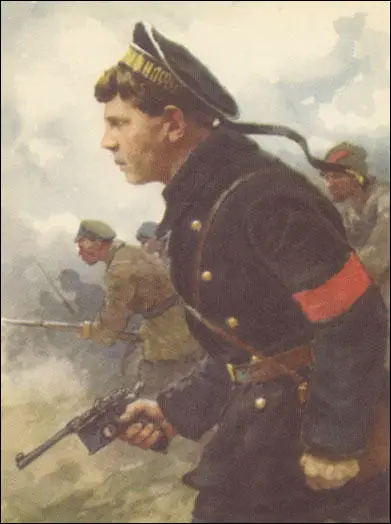
the Red Army until his death on 26th July, 1919. He was 24 years old.
After his escape from prison, General Lavr Kornilov and his supporters made their way to the Don region, which was controlled by Cossacks. Here they linked up with General Mikhail Alekseev. Kornilov became the military commander of the anti-Bolshevik Volunteer Army with Alekseev as the political chief. Kornilov promised, "the greater the terror, the greater our victories." He claimed he would be successful even if it was needed "to set fire to half the country and shed the blood of three-quarters of all Russians." (33) Victor Serge claims that in the village of Lezhanka alone, bands of Kornilov's officers killed more than 500 people. (34)
People who were willing to take up arms against the Bolshevik government became known as the White Army. However, they had mixed opinions about what kind of Russia they wanted: "Officers and politicians who remained pro-monarchist attached themselves to each of the White armies because politically there was nowhere else for them to turn. Tension would surface in each of the White armies between those favouring the more democratic progressivism of the February Revolution and those who could not reconcile themselves to it. They made a common if uneasy cause against the Bolsheviks." (35)
General Peter Wrangel, a commander in the north Caucasus, claimed that it was difficult to hold on to areas taken from the Red Army: "In the course of the last few months my command had received considerable reinforcements. In spite of heavy losses, its strength was almost normal. We were well supplied with artillery, technical equipment, telephones, telegraphs, and so on, which we had taken from the enemy. When the Reds had succeeded in making themselves masters of the Kuban district they had recourse to conscription there. Now these forced recruits were deserting en masse, and coming over to us to defend their homes. They were good fighters, but once their own village was cleared of Reds, many of them left the ranks to cultivate their land once more." (36)
Both sides carried out atrocities. One journalist claimed that the Red Army received orders on how to behave by the Bolshevik government: "It was proposed to take hostages from the former officers of the Tsar's army, from the Cadets and from the families of the Moscow and Petrograd middle-classes and to shoot ten for every Communist who fell to the White terror.... The reason given by the Bolshevik leaders for the Red terror was that conspirators could only be convinced that the Soviet Republic was powerful enough to be respected if it was able to punish its enemies, but nothing would convince these enemies except the fear of death, as all were persuaded that the Soviet Republic was falling. Given these circumstances, it is difficult to see what weapon the Communists could have used to get their will respected." (37)
The White Army also carried out acts of terror. Major-General Mikhail Drozdovsky wrote in his diary: "We arrived at Vladimirovka about 5.00 p.m. Having surrounded the village we placed the platoon in position, cut off the ford with machine-guns, fired a couple of volleys in the direction of the village, and everybody there took cover. Then the mounted platoon entered the village, met the Bolshevik committee, and put the members to death. After the executions, the houses of the culprits were burned and the whole male population under forty-five whipped soundly, the whipping being done by the old men. Then the population was ordered to deliver without pay the best cattle, pigs, fowl, forage, and bread for the whole detachment, as well as the best horses." (38)
Walter Duranty, a journalist working for the New York Times interviewed a White Army officer who admitted that they shot all captured members of the Red Army: "They're all Communists, and we can't keep them, you know; they make trouble in the prison camps and start rebellions, and so on. So now we always shoot them. That lot is going back to headquarters for examination - of course they never tell anything, Communists don't, but one or two might be stupid and give away some useful information - then we'll have to shoot them. Of course we don't shoot prisoners, but Communists are different. They always make trouble, so we have no choice." (39)
General Alexander Kolchak joined the rebellion and agreed to become a minister in the Provisional All-Russian Government based in Omsk. In November 1918, ministers who were members of the Socialist Revolutionary Party were arrested and Kolchak was named Supreme Ruler with dictatorial powers. In his first speech he claimed: "I will not go down the path of reaction, nor the ruinous path of party politics... my main goal is to create a battle-worthy army, attain a victory over Bolshevism, and establish law and order so that the people may without prejudice choose for themselves the manner of government which they prefer." (40)
General Alfred Knox wrote that Kolchak had "more grit, pluck and honest patriotism than any Russian in Siberia." However, others were not so convinced. "The character and soul of the Admiral are so transparent that one needs no more than one week of contact to know all there is to know about him. He is a big, sick child, a pure idealist, a convinced slave of duty and service to an idea and to Russia.... He is utterly absorbed by the idea of serving Russia, of saving her from Red oppression, and restoring her to full power and to the inviolability of her territory... He passionately despises all lawlessness and arbitrariness, but because he is so uncontrolled and impulsive, he himself often unintentionally transgresses against the law, and this mainly when seeking to uphold the same law, and always under the influence of some outsider." (41)
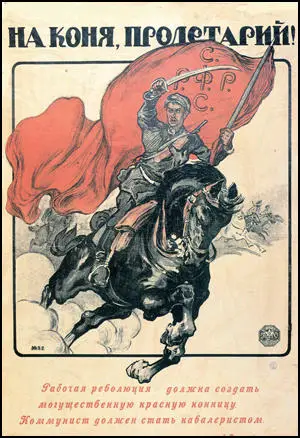
The Socialist Revolutionaries (SR) now changed sides and joined forces with the Red Army. Kolchak reacted by bring in new laws which established capital punishment for attempting to overthrow the authorities. He also announced that “insults written, printed, and oral, are punishable by imprisonment". Other measures imposed by Kolchak included the suppression of trade unions, disbanding of soviets, and returned factories and land to their previous owners. Kolchak was accused of committing war crimes and one report claimed that he had 25,000 people killed in Ekaterinburg. (42)
The White Army initially had success in the Ukraine where the Bolsheviks were unpopular. The main resistance came from Nestor Makhno, the leader of an Anarchist army in the area. Anarchists chose to work with the Bolsheviks, hoping for a moderation of their policies. Vladimir Antonov-Ovseenko, led the Red Army and gradually pro-Bolsheviks took control of the Ukraine.
In January 1918 General Lavr Kornilov had around 3,000 men. To crush this force, the Bolsheviks sent an army of 10,000. On 24th February 1918, the Red Army captured Rostov. Kornilov, badly outnumbered, escaped to Ekaterinodar, the capital of the Kuban Soviet Republic. However, in the early morning of 13th April, a Soviet shell landed on his farmhouse headquarters and killed him. He was buried in a nearby village. A few days later, when the Bolsheviks gained control of the village, they unearthed Kornilov's coffin, dragged his corpse to the main square and burnt his remains on the local rubbish dump. (43)
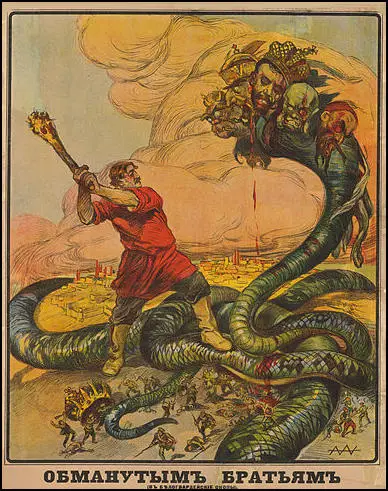
In June 1918 the Allies agreed to send military forces to help the White Army against the Soviet government. The following month French troops were landed in Vladivostok. The French appointed General Maurice Janin head of their military mission and placed him in charge of the Allied forces in western Siberia. "The French themselves contributed 1,076 troops in the summer of 1918. These included an Indo-Chinese battalion, an artillery battery and a reinforced company of volunteers from Alsace-Lorraine." (44)
The British landed 543 men of the 25th Battalion, Middlesex Regiment, under the command of Lieutenant-Colonel John Ward, in the summer of 1918. A former member of the Social Democratic Federation, he was initially sympathetic to the Red Army. However, he was appalled by the atrocities committed by the Bolsheviks. With the help of General Alfred Knox, the head of the British Military Mission, he helped to supply and train the White Army in Siberia. (45)
Brian Horrocks was a British officer who served under Ward, and was told by him that involvement in the Civil War was dangerous: "I believe we shall rue this business for many years. It is always unwise to intervene in the domestic affairs of any country. In my opinion the Reds are bound to win and our present policy will cause bitterness between us for a long time to come." Horrocks agreed: "How right he was: there are many people today who trace the present international impasse back to that fatal year of 1919. This was well above my head: the whole project sounded most exciting and that was all I cared about." (46)
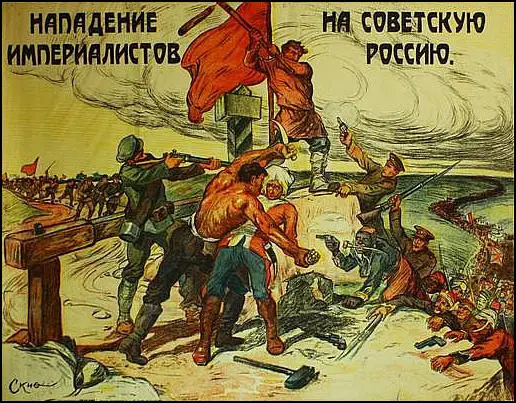
Among the major Allied powers the Japanese were in the best position to intervene in Siberia. Japan had significant commercial and strategic interests in the Russian Far East, and although they had begun arriving in large numbers on the Western Front, they were relatively fresh to the horrors of trench warfare and had troops to spare. The Japanese arrived on 3rd August and began operating against the Bolsheviks in the Amur and Assuri regions. By November their numbers reached 72,400. (47)
General William S. Graves was given command of the 8th Infantry Division and sent to Siberia under direct orders from President Woodrow Wilson. His orders were to remain strictly apolitical amidst a politically turbulent situation. His main objective was to make sure the Trans-Siberian railroad stayed operational. American troops did not intervene in the the Civil War despite strong pressure brought on Graves to help the White Army by Admiral Alexander Kolchak. (48)
Morgan Philips Price, a journalist working for the Manchester Guardian, believed that foreign aid helped the Bolsheviks: "The Whites felt that they were saving Russia from the tyranny of a minority and were intending, if victorious, to restore the social order they had always known, tempered with what they vaguely called 'Western Democracy'. The Reds knew they were a minority facing another minority with a majority of waverers and undecided neutrals who would be influenced by the fortunes of the struggle. They felt that they stood for a nobler, higher order of society than that which they had overthrown. It was, therefore, a question which of these two minorities had the strongest moral conviction, which of them had the most courage and belief in themselves. The impression that I now have looking back on these days is that the Bolsheviks won through partly at least because the Whites had prejudiced their cause by calling in the aid of the foreigner." (49)
Lenin appointed Leon Trotsky as commissar of war and was sent to rally the Red Army in the Volga. Soon after taking command he issued the following order: “I give warning that if any unit retreats without orders, the first to be shot down will be the commissary of the unit, and next the commander. Brave and gallant soldiers will be appointed in their places. Cowards, bastards and traitors will not escape the bullet. This I solemnly promise in the presence of the entire Red Army.” (50)
Trotsky proved to be an outstanding military commander and Kazan and Simbirsk were recaptured in September, 1918. The following month he took Samara but the White Army did make progress in the south when General Anton Denikin took control of the Kuban region and General Peter Wrangel began to advance up the Volga. By October, 1918, General Denikin's army had swelled to 100,000 and occupied a front of two hundred miles. (51)
Trotsky announced his strategy on how to defeat the White Army. "Recognizing the existence of an acute military danger, we must take steps really to transform Soviet Russia into a military camp. With the help of the party and the trade-unions a registration must be carried out listing every member of the party, of the Soviet institutions and the trade-unions, with a view to using them for military service." (52)
The main threat to the Bolshevik government came from General Nikolai Yudenich. On 14th October, 1918, he captured Gatchina, only 50 kilometres from Petrograd. It is estimated that there were 200,000 foreign soldiers supporting the anti-Bolshevik forces. Trotsky arrived to direct the defence of the capital. He was not very impressed and it is claimed that his first action was to order Ivan Pavlunovsky, chief of the special section of the Petrograd Cheka, to carry out executions. "Comrade Pavlunovsky, I command you to arrest immediately and shoot the entire staff for the defence of Petrograd." (53)
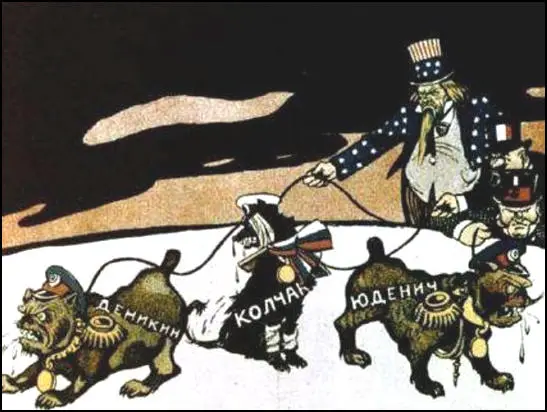
with the dogs, Anton Denikin, Alexander Kolchak and Nikolai Yudenich on leash (1918)
Trotsky made it clear to the people of Petrograd that the city would not be surrendered: "As soon as the masses began to feel that Petrograd was not to be surrendered, and if necessary would be defended from within, in the streets and squares, the spirit changed at once. The more courageous and self-sacrificing lifted up their heads. Detachments of men and women, with trenching-tools on their shoulders, filed out of the mills and factories.... The whole city was divided into sections, controlled by staffs of workers. The more important points were surrounded by barbed wire. A number of positions were chosen for artillery, with a firing range marked off in advance. About sixty guns were placed behind cover on the open squares and at the more important street-crossings. Canals, gardens; walls, fences and houses were fortified. Trenches were dug in the suburbs and along the Neva. The whole southern part of the city was transformed into a fortress. Barricades were raised on many of the streets and squares." (54)
General Vemrenko's army failed in their efforts to cut the vital railway from Tosno to Moscow allowing the Red Army to freely reinforce Petrograd. The 15th Red Army struck from Pskov to Luga, threatening the White right flank and centre. The 7th Red Army now reorganised and reinforced by thousands of Red Guards raised from inside the city pressed westward against the White left and centre. Their combined strength, at least 73,000, forced the Whites back to their original starting point at Narva. (55)
In March, 1919, Admiral Alexander Kolchak captured Ufa and was posing a threat to Kazan and Samara. However, his acts of repression had resulted in the formation of Western Siberian Peasants' Red Army. The Red Army, led by Mikhail Frunze, also made advances and entered Omsk in November, 1919. Kolchak fled eastwards and was promised safe passage by the Czechoslovaks to the British military mission in Irkutsk. However, he was handed over to the Socialist Revolutionaries. He appeared before a five man commission between 21st January and 6th February. At the end of the hearing he was sentenced to death and executed. (56)
Another outstanding Red military commander was Nestor Makhno, an anarchist from the Ukraine. According to Victor Serge: "Nestor Makhno, boozing, swashbuckling, disorderly and idealistic, proved himself to be a born strategist of unsurpassed ability. The number of soldiers under his command ran at times into several tens of thousands. His arms he took from the enemy. Sometimes his insurgents marched into battle with one rifle for every two or three men: a rifle which, if any soldier fell, would pass at once from his still-dying hands into those of his alive and waiting neighbour." (57)
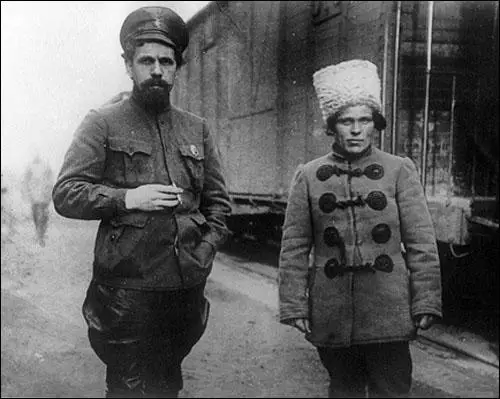
Nesto Makhno always had a large black flag, the symbol of anarchy, at the head of his army, embroidered with the slogans "Liberty or Death" and "the Land to the Peasants, the Factories to the Workers". Makhno later told Emma Goldman that his objective was to establish a libertarian society in the south that would serve as a model for the whole of Russia. When he set-up his first commune near Pokrovskoye, he named it in honour of Rosa Luxemburg.
General Peter Wrangel did not tolerate lawlessness or looting by his troops during the Civil War. (58) However, he complained that this was not always the case. "The war is becoming to some a means of growing rich; re-equipment has degenerated into pillage and peculation. Each unit strives to secure as much as possible for itself, and seizes everything that comes to hand. What cannot be used on the spot is sent back to the interior and sold at a profit.... A considerable number of troops have retreated to the interior, and many officers are away on prolonged missions, busy selling and exchanging loot. The Army is absolutely demoralized, and is fast becoming a collection of tradesmen and profiteers. All those employed on re-equipment work - that is to say, nearly all the officers - have enormous sums of money in their possession; as a result, there has been an outbreak of debauchery, gambling and wild orgies." (59)
The Red Army continued to grow and now had over 500,000 soldiers in its ranks. This included over 40,000 officers who had served under Nicholas II. This was an unpopular decision with many Bolsheviks who feared that given the opportunity, they would betray their own troops. Trotsky tried to overcome this problem by imposing a strict system of punishment for those who were judged to be disloyal. "The Red army had in its service thousands, and, later on, tens of thousands of old officers. In their own words many of them only two years before had thought of moderate liberals as extreme revolutionaries." (60)
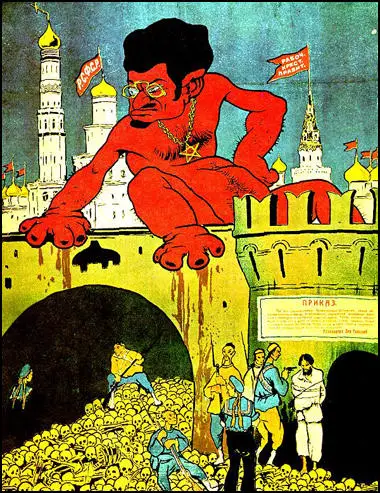
In February 1920, General Peter Wrangel was dismissed for conspiring against General Anton Denikin. However, two months later, he was recalled and was given command of the White Army in the Crimea. During this period he recognized and established relations with the new anti-Bolshevik independent republics of Ukraine and Georgia and established a coalition government which attempted to institute progressive land reforms. (61)
On 12th October, 1920, the Bolsheviks signed a peace agreement with Poland. On hearing the news General Peter Wrangel issued the following order: "The Polish Army which has been fighting side by side with us against the common enemy of liberty and order has just laid down its arms and signed a preliminary peace with the oppressors and traitors who designate themselves the Soviet Government of Russia. We are now alone in the struggle which will decide the fate not only of our country but of the whole of humanity. Let us strive to free our native land from the yoke of these Red scum who recognize neither God nor country, who bring confusion and shame in their wake. By delivering Russia over to pillage and ruin, these infidels hope to start a world-wide conflagration." (62)
executed by members of the White Army.
Leon Trotsky was now able to transfer the majority of their combat troops against the southern Whites. Nestor Makhno contributed a brigade from his insurgent army, the majority mounted on horses. In all, there were 188,000 infantry, cavalry and engineers with 3,000 machine-guns, 600 artillery pieces and 23 armoured trains. General Wrangel's army consisted of 23,000 infantry and 12,000 cavalry. (63)
Wrangel was able to hold out for six months but defeat was inevitable. On 11th November, 1920, he ordered his troops to disengage and fall back to the assigned ports for evacuation from the Crimean ports at Eupatoria, Sevastopol, Yalta, Theodosia and Kerch. It is believed that 126 ships had been commandeered to take 145,693 members of the White Army into exile.
David Bullock, the author of The Russian Civil War (2008) has argued that no one has been able to calculate accurately the cost in human life attributable to the Civil War. "Reasoned estimates have placed the number of dead from battle and disease in the Red Army as low as 425,000 and as high as 1,213,000. Numbers for their opponents range from 325,000 to 1,287,000." Another 200,000-400,000 died in prison or were executed as a result of the "Red Terror". A further 50,000 may have been victims of the corresponding "White Terror". Another 5 million are believed to have died in the ensuing famines of 1921-1922, directly caused by the economic disruption of the war. Bullock concludes that in total between 7 and 14 million died as a result of the Russian Civil War. (64)
Kronstadt Uprising
The sailors at the Kronstadt naval base had long been a source of radical dissent. On 27th June, 1905, sailors on the Potemkin battleship, protested against the serving of rotten meat infested with maggots. The captain ordered that the ringleaders to be shot. The firing-squad refused to carry out the order and joined with the rest of the crew in throwing the officers overboard. The mutineers killed seven of the Potemkin's eighteen officers, including Captain Evgeny Golikov. They organized a ship's committee of 25 sailors, led by Afanasi Matushenko, to run the battleship. This was the beginning of the 1905 Russian Revolution. (65)
Mutinies had taken place during the 1905 Revolution and played an important role in persuading Nicholas II to issue his October Manifesto. The Kronstadt sailors were also active in the formation of one of the most important Soviets in the summer of 1917. Morgan Philips Price, a journalist working for of the Manchester Guardian, went to interview the President of the Kronstadt Workers', Soldiers' and Sailors Soviet. "The soldiers and sailors were treated on this island like dogs. They were worked from early morning till late at night. They were not allowed any recreations for fear that they would associate for political purposes. Nowhere could you study the slavery system of capitalist imperialism better than here. For the smallest misdemeanor a man was put in chains, and if he was found with a Socialist pamphlet in his possession he was shot." (66)
On 24th October, 1917, Lenin wrote a letter to the members of the Central Committee: "The situation is utterly critical. It is clearer than clear that now, already, putting off the insurrection is equivalent to its death. With all my strength I wish to convince my comrades that now everything is hanging by a hair, that on the agenda now are questions that are decided not by conferences, not by congresses (not even congresses of soviets), but exclusively by populations, by the mass, by the struggle of armed masses… No matter what may happen, this very evening, this very night, the government must be arrested, the junior officers guarding them must be disarmed, and so on… History will not forgive revolutionaries for delay, when they can win today (and probably will win today), but risk losing a great deal tomorrow, risk losing everything." (67)
Leon Trotsky supported Lenin's view and urged the overthrow of the Provisional Government. On the evening of 24th October, orders were given for the Bolsheviks to occupy the railway stations, the telephone exchange and the State Bank. The Smolny Institute became the headquarters of the revolution and was transformed into a fortress. Trotsky reported that the "chief of the machine-gun company came to tell me that his men were all on the side of the Bolsheviks". (68)
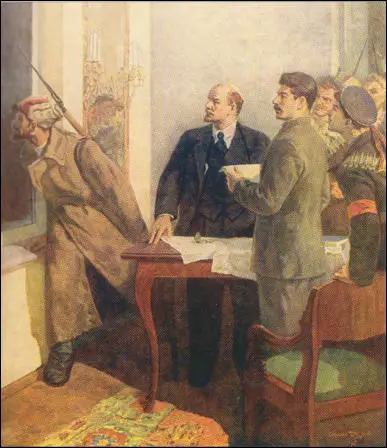
The following day the Red Guards surrounded the Winter Palace. Inside was most of the country's Cabinet, although Alexander Kerensky had managed to escape from the city. The palace was defended by Cossacks, some junior army officers and the Woman's Battalion. At 9 p.m. The Aurora and the Peter and Paul Fortress began to open fire on the palace. Little damage was done but the action persuaded most of those defending the building to surrender. The Red Guards, led by Vladimir Antonov-Ovseenko, now entered the Winter Palace. (69)
Leon Trotsky later admitted the Kronstadt sailors played an important role in the Russian Revolution. However, by 1921 the Kronstadt sailors had become disillusioned with the Bolshevik government. They were angry about the lack of democracy, the Red Terror and the policy of War Communism. The Soviet historian, David Shub, has argued: "On 1 March 1921, the sailors of Kronstadt revolted against Lenin. Mass meetings of 15,000 men from various ships and garrisons passed resolutions demanding immediate new elections to the Soviet by secret ballot; freedom of speech and the press for all left-wing Socialist parties; freedom of assembly for trade unions and peasant organizations; abolition of Communist political agencies in the Army and Navy; immediate withdrawal of all grain requisitioning squads, and re-establishment of a free market for the peasants." (70)
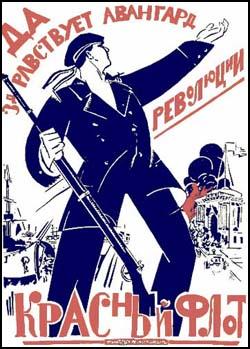
On 28th February, 1921, the crew of the battleship, Petropavlovsk, passed a resolution calling for a return of full political freedoms. It was reported by Radio Moscow: that the sailors were supporters of the White Army: "Just like other White Guard insurrections, the mutiny of General Kozlovsky and the crew of the battleship Petropavlovsk has been organised by Entente spies. The French counter espionage is mixed up in the whole affair. History is repeating itself. The Socialist Revolutionaries, who have their headquarters in Paris, are preparing the ground for an insurrection against the Soviet power." (71)
I response to this broadcast the Kronstadt sailors issued the following statement: "Comrade workers, red soldiers and sailors. We stand for the power of the Soviets and not that of the parties. We are for free representation of all who toil. Comrades, you are being misled. At Kronstadt all power is in the hands of the revolutionary sailors, of red soldiers and of workers. It is not in the hands of White Guards, allegedly headed by a General Kozlovsky, as Moscow Radio tells you." (72)
Eugene Lyons, the author of Workers’ Paradise Lost: Fifty Years of Soviet Communism: A Balance Sheet (1967), pointed out that this protest was highly significant because of Kronstadt's revolutionary past: "The hundreds of large and small uprisings throughout the country are too numerous to list, let alone describe here. The most dramatic of them, in Kronstadt, epitomizes most of them. What gave it a dimension of supreme drama was the fact that the sailors of Kronstadt, an island naval fortress near Petrograd, on the Gulf of Finland, had been one of the main supports of the putsch. Now Kronstadt became the symbol of the bankruptcy of the Revolution. The sailors on the battleships and in the naval garrisons were in the final analysis peasants and workers in uniform." (73)
Lenin denounced the Kronstadt Uprising as a plot instigated by the White Army and their European supporters. However, in private he realised that he was under attack from the left. He was particularly concerned by the "scene of the rising was Kronstadt, the Bolshevik stronghold of 1917". Isaac Deutscher claims that Lenin commented: "This was the flash which lit up reality better than anything else." (74)
On 6th March, 1921, Leon Trotsky issued a statement: "I order all those who have raised a hand against the Socialist Fatherland, immediately to lay down their weapons. Those who resist will be disarmed and put at the disposal of the Soviet Command. The arrested commissars and other representatives of the Government must be freed immediately. Only those who surrender unconditionally will be able to count on the clemency of the Soviet Republic." (75)
Trotsky then ordered the Red Army to attack the Kronstadt sailors. According to one official report, some members of the Red Army refused to attack the naval base. "At the beginning of the operation the second battalion had refused to march. With much difficulty and thanks to the presence of communists, it was persuaded to venture on the ice. As soon as it reached the first south battery, a company of the 2nd battalion surrendered. The officers had to return alone." (76)
Felix Dzerzhinsky, the head of Cheka, was also involved in putting down the uprising, as the loyalty of the Red Army soldiers were in doubt. Victor Serge pointed out: "Lacking any qualified officers, the Kronstadt sailors did not know how to employ their artillery; there was, it is true, a former officer named Kozlovsky among them, but he did little and exercised no authority. Some of the rebels managed to reach Finland. Others put up a furious resistance, fort to fort and street to street.... Hundreds of prisoners were taken away to Petrograd and handed to the Cheka; months later they were still being shot in small batches, a senseless and criminal agony. Those defeated sailors belonged body and soul to the Revolution; they had voiced the suffering and the will of the Russian people. This protracted massacre was either supervised or permitted by Dzerzhinsky." (77)
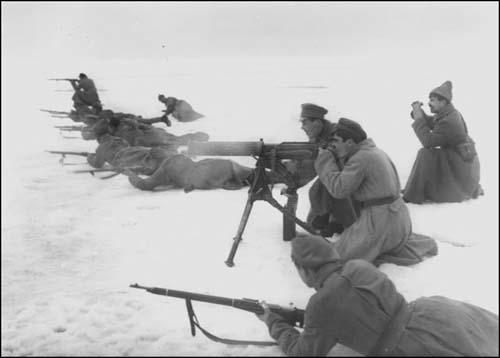
Some observers claimed that many of the victims would die shouting, "Long live the Communist International!" and "Long live the Constituent Assembly!" It was not until the 17th March that government forces were able to take control of Kronstadt. Alexander Berkman, wrote: "Kronstadt has fallen today. Thousands of sailors and workers lie dead in its streets. Summary execution of prisoners and hostages continues." (78)
An estimated 8,000 people (sailors and civilians) left Kronstadt and went to live in Finland. Official figures suggest that 527 people were killed and 4,127 were wounded. "These figures do not include the drowned, or the numerous wounded left to die on the ice. Nor do they include the victims of the Revolutionary Tribunals." Historians who have studied the uprising believe that the total number of casualties was much higher than this. It is claimed that over 500 sailors at Kronstadt were executed for their part in the rebellion. (79)
Nikolai Sukhanov reminded Leon Trotsky that three years previously he had told the people of Petrograd: "We shall conduct the work of the Petrograd Soviet in a spirit of lawfulness and of full freedom for all parties. The hand of the Presidium will never lend itself to the suppression of the minority." Trotsky lapsed into silence for a while, then said wistfully: "Those were good days." Walter Krivitsky, who was a Cheka agent during this period claimed that when Trotsky put down the Kronstadt Uprising the Bolshevik government lost contact with the revolution and from then on it would be a path of state terror and dictatorial rule. (80)
Alexander Berkman decided to leave the Soviet Union after the Kronstadt Rising: "Grey are the passing days. One by one the embers of hope have died out. Terror and despotism have crushed the life born in October. The slogans of the Revolution are forsworn, its ideals stifled in the blood of the people. The breath of yesterday is dooming millions to death; the shadow of today hangs like a black pall over the country. Dictatorship is trampling the masses under foot. The Revolution is dead; its spirit cries in the wilderness.... I have decided to leave Russia." (81)
Leon Trotsky later blamed Nestor Makhno and the anarchists for the uprising. "Makhno... was a mixture of fanatic and adventurer. He became the concentration of the very tendencies which brought about the Kronstadt Uprising. Makhno created a cavalry of peasants who supplied their own horses. They were not downtrodden village poor whom the October Revolution first awakened, but the strong and well-fed peasants who were afraid of losing what they had. The anarchist ideas of Makhno (the ignoring of the State, non-recognition of the central power) corresponded to the spirit of the kulak cavalry as nothing else could. I should add that the hatred of the city and the city worker on the part of the followers of Makhno was complemented by the militant anti-Semitism." (82)
Trotsky also accused Felix Dzerzhinsky of being responsible for the massacre: "The truth of the matter is that I personally did not participate in the least in the suppression of the Kronstadt rebellion, nor in the repressions following the suppression. In my eyes this very fact is of no political significance. I was a member of the government, I considered the quelling of the rebellion necessary and therefore bear responsibility for the suppression. Concerning the repressions, as far as I remember, Dzerzhinsky had personal charge of them and Dzerzhinsky could not tolerate anyone's interference with his functions (and properly so). Whether there were any needless victims I do not know. On this score I trust Dzerzhinsky more than his belated critics." (83)
Death of Lenin
In 1921 Lenin became concerned with the activities of Alexandra Kollontai and Alexander Shlyapnikov, the leaders of the Workers' Opposition group. In 1921 Kollantai published a pamphlet The Workers' Opposition, where she called for members of the party to be allowed to discuss policy issues and for more political freedom for trade unionists. She also advocated that before the government attempts to "rid Soviet institutions of the bureaucracy that lurks within them, the Party must first rid itself of its own bureaucracy." (84)
The group also published a statement on future policy: "A complete change is necessary in the policies of the government. First of all, the workers and peasants need freedom. They don't want to live by the decrees of the Bolsheviks; they want to control their own destinies. Comrades, preserve revolutionary order! Determinedly and in an organized manner demand: liberation of all arrested Socialists and non-partisan working-men; abolition of martial law; freedom of speech, press and assembly for all who labour." (85)
At the Tenth Party Congress in April 1922, Lenin proposed a resolution that would ban all factions within the party. He argued that factions within the party were "harmful" and encouraged rebellions such as the Kronstadt Rising. The Party Congress agreed with Lenin and the Workers' Opposition was dissolved. Stalin was appointed as General Secretary and was now given the task of dealing with the "factions and cliques" in the Communist Party. (86)
Stalin's main opponents for the future leadership of the party failed to see the importance of this position and actually supported his nomination. They initially saw the post of General Secretary as being no more that "Lenin's mouthpiece". According to Edvard Radzinsky, the author of Stalin (1996): "Factionalism became punishable by expulsion. Lenin sought to stifle the very possibility of opposition. The wording of this resolution, unthinkable in a democratic party, grated on the ear, and it was therefore kept secret from the public." (87)
Roy A. Medvedev, has argued in Let History Judge: The Origins and Consequences of Stalinism (1971) that on the surface it was a strange decision: "In 1922 Stalin was the least prominent figure in the Politburo. Not only Lenin but also Trotsky, Zinoviev, Kamenev, Bukharin, and A. I. Rykov were much more popular among the broad masses of the Party than Stalin. Close-mouthed and reserved in everyday affairs, Stalin was also a poor public speaker. He spoke in a low voice with a strong Caucasian accent, and found it difficult to speak without a prepared text. It is not surprising that, during the stormy years of revolution and civil war, with their ceaseless meetings, rallies, and demonstrations, the revolutionary masses saw or heard little of Stalin." (88)
Isaac Deutscher, the author of Stalin (1949) has pointed out: "The leading bodies of the party were now top-heavy; and a new office, that of the General Secretary, was created, which was to coordinate the work of their many growing and overlapping branches... Soon afterwards a latent dualism of authority began to develop at the very top of the party. The seven men who now formed the Politbureau (in addition to the previous five, Zinoviev and Tomsky had recently been elected) represented, as it were, the brain and the spirit of Bolshevism. In the offices of the General Secretariat resided the more material power of management and direction." (89)
Soon after Stalin's appointment as General Secretary, Lenin went into hospital to have a bullet removed from his body that had been there since Dora Kaplan's assassination attempt. It was hoped that this operation would restore his health. This was not to be; soon afterwards, a blood vessel broke in Lenin's brain. This left him paralyzed all down his right side and for a time he was unable to speak. As "Lenin's mouthpiece", Joseph Stalin had suddenly become extremely important. (90)
While Lenin was immobilized, Stalin made full use of his powers as General Secretary. At the Party Congress he had been granted permission to expel "unsatisfactory" party members. This enabled Stalin to remove thousands of supporters of Leon Trotsky, his main rival for the leadership of the party. As General Secretary, Stalin also had the power to appoint and sack people from important positions in the government. The new holders of these posts were fully aware that they owed their promotion to Stalin. They also knew that if their behaviour did not please him they would be replaced.
Surrounded by his supporters, Stalin's confidence began to grow. In October, 1922, he disagreed with Lenin over the issue of foreign trade. When the matter was discussed at Central Committee, Stalin's rather than Lenin's policy was accepted. Lenin began to fear that Stalin was taking over the leadership of the party. Lenin wrote to Trotsky asking for his support. Trotsky agreed and at the next meeting of the Central Committee the decision on foreign trade was reversed. Lenin, who was too ill to attend, wrote to Trotsky congratulating him on his success and suggesting that in future they should work together against Stalin.
Joseph Stalin, whose wife Nadya Alliluyeva worked in Lenin's private office, soon discovered the contents of the letter sent to Leon Trotsky. Stalin was furious as he realized that if Lenin and Trotsky worked together against him, his political career would be at an end. In a fit of temper Stalin made an abusive phone-call to Lenin's wife, Nadezhda Krupskaya, accusing her of endangering Lenin's life by allowing him to write letters when he was so ill. (91)
After Krupskaya told her husband of this phone-call, Lenin made the decision that Stalin was not the man to replace him as the leader of the party. Lenin knew he was close to death so he dictated to his secretary a letter that he wanted to serve as his last "will and testament". The document was comprised of his thoughts on the senior members of the party leadership. Lenin stated: "Comrade Stalin, having become General Secretary, has concentrated enormous power in his hands: and I am not sure that he always knows how to use that power with sufficient caution. I therefore propose to our comrades to consider a means of removing Stalin from this post and appointing someone else who differs from Stalin in one weighty respect: being more tolerant, more loyal, more polite, more considerate of his comrades." (92)
A few days later Lenin added a postscript to his earlier testament: "Stalin is too rude, and this fault... becomes unbearable in the office of General Secretary. Therefore, I propose to the comrades to find a way to remove Stalin from that position and appoint to it another man... more patient, more loyal, more polite and more attentive to comrades, less capricious, etc. This circumstance may seem an insignificant trifle, but I think that from the point of view of preventing a split and from the point of view of the relations between Stalin and Trotsky... it is not a trifle, or it is such a trifle as may acquire a decisive significance." Three days after writing this testament Lenin had a third stroke. Lenin was no longer able to speak or write and although he lived for another ten months, he ceased to exist as a power within the Soviet Union. (93)
Lenin died of a heart attack on 21st January, 1924. Stalin reacted to the news by announcing that Lenin was to be embalmed and put on permanent display in a mausoleum to be erected on Red Square. Lenin's wife, Nadezhda Krupskaya, immediately objected because she disliked the "quasi-religious" implications of this decision. Despite these objections, Stalin carried on with the arrangements. "Lenin, who detested hero worship and fought religion as an opiate for the people, who canonized in the interest of Soviet politics and his writings were given the character of Holy Writ." (94)
The funeral took place on 27th January, and Stalin was a pallbearer with Lev Kamenev, Gregory Zinoviev, Nickolai Bukharin, Vyacheslav Molotov, Felix Dzerzhinsky and Maihail Tomsky. Stalin gave a speech which ended with the words: "Leaving us, comrade Lenin left us a legacy of fidelity to the principles of the Communist International. We swear to you, comrade Lenin, that we will not spare our own lives in strengthening and broadening the union of labouring people of the whole world - the Communist International." (95)
